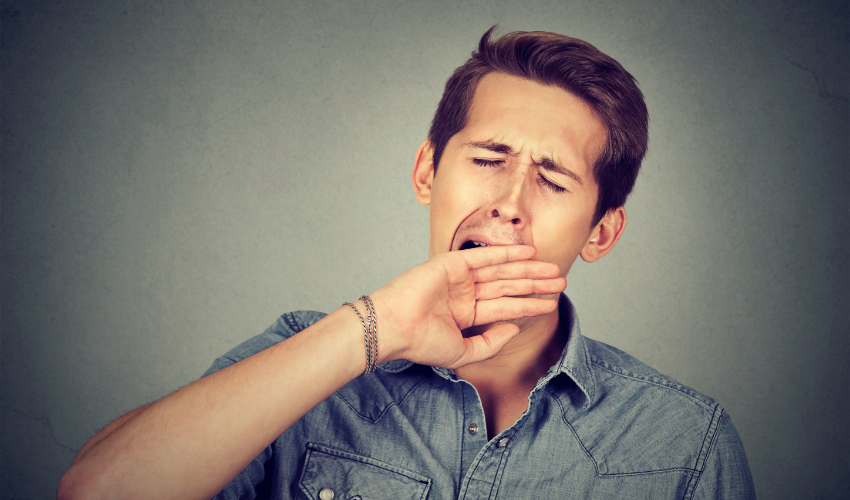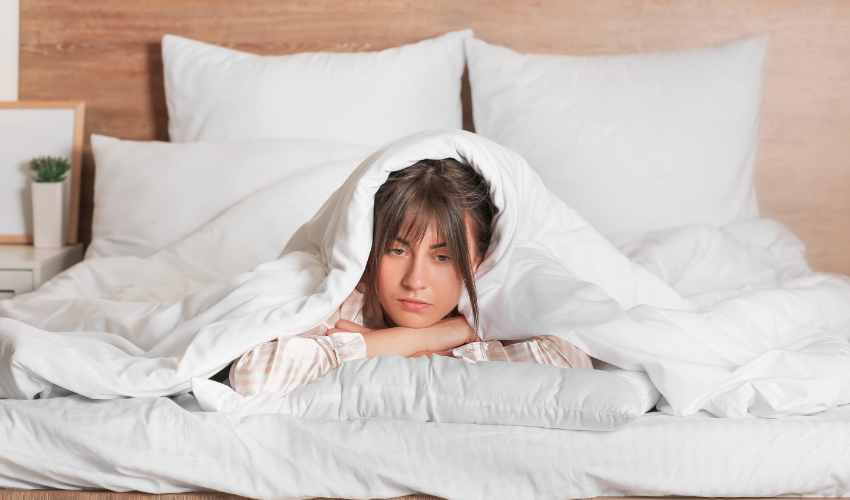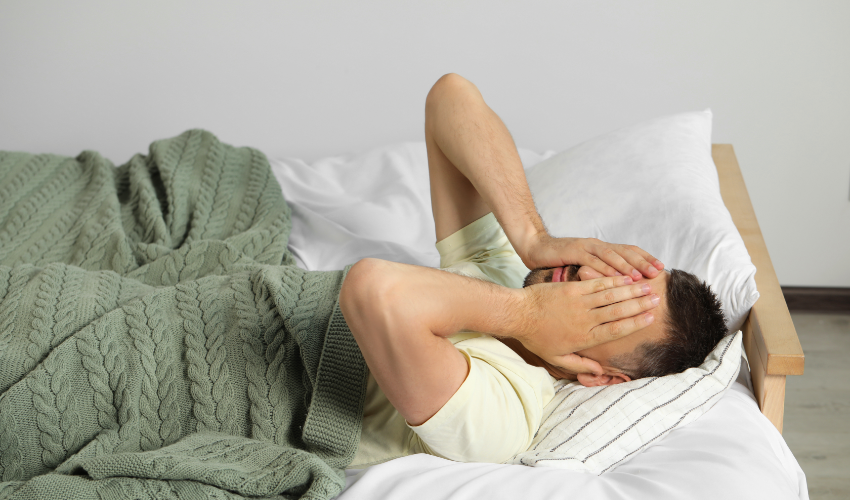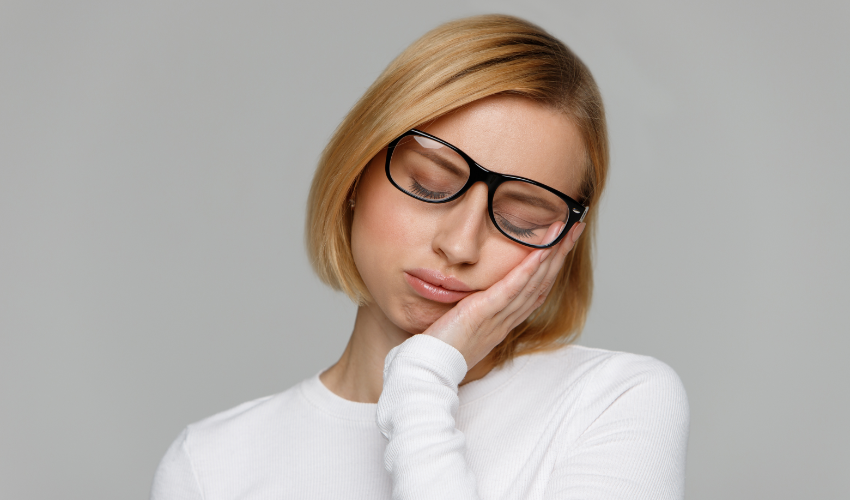As humans, we need a good night’s rest to function at our best. Sleep is essential for our physical and mental health, yet many of us sacrifice sleep for other activities, such as work, school, or socializing. Sleep deprivation is a common issue that affects people of all ages and can have significant negative effects on our lives.
At its core, sleep deprivation is a condition where an individual does not get enough sleep, leading to several symptoms and side effects. In this article, we will explore the signs and effects of sleep deprivation, and why it’s crucial to take steps to address this issue.

The Signs of Sleep Deprivation
One of the most obvious sleep deprivation symptoms is feeling excessively tired or fatigued during the day. However, there are several other symptoms that may indicate that you’re not getting enough sleep. These include:
Difficulty Concentrating or Staying Focused
Sleep deprivation can severely impact your ability to concentrate and stay focused on tasks. Without adequate sleep, the brain becomes fatigued, making it harder to stay alert and pay attention. This can lead to decreased productivity and increased mistakes, impacting daily life and work performance.
Mood swings or Irritability
Lack of sleep can also affect your mood and emotional state. People who are sleep deprived often experience mood swings, irritability, and feelings of frustration and anger. This can lead to strained relationships and conflicts with others.
Memory Problems
Sleep is crucial for consolidating and organizing memories in the brain. When you don’t get enough sleep, your memory can suffer, making it harder to recall information and learn new things. This can be particularly problematic for students or those in jobs that require a sharp memory.
Difficulty with Decision-Making or Problem-Solving
Sleep deprivation can also impact cognitive functions such as decision-making and problem-solving. Without enough rest, the brain is not able to process information effectively, making it harder to weigh options, make decisions, and solve problems.
Reduced Sex Drive
Sleep deprivation can also affect your sexual health and libido. Lack of sleep can lead to decreased testosterone levels in men and decreased estrogen levels in women, both of which play a role in sexual desire. In addition, the physical and mental fatigue caused by sleep deprivation can lower one’s interest in sex.
Increased Appetite and Cravings for High-Carbohydrate Food
Sleep deprivation can disrupt the balance of hormones that regulate hunger and fullness, leading to increased appetite and cravings for high-carbohydrate foods. This can contribute to weight gain and make it harder to maintain a healthy diet.
Weight Gain or Difficulty Losing Weight
Sleep deprivation can disrupt the balance of hormones that regulate metabolism, making it easier to gain weight and harder to lose weight. In addition, lack of sleep can lead to increased appetite and cravings for high-carbohydrate foods, further contributing to weight gain.
Headaches or Migraines
Sleep deprivation can also cause headaches and migraines, as well as make existing headaches and migraines worse. This is due to the increased stress and tension that can occur in the body when you don’t get enough sleep.
Reduced Immune Function
Sleep is important for maintaining a healthy immune system. Lack of sleep can weaken the immune system, making it harder for the body to fight off illness and infection. This can lead to increased frequency and severity of colds, flu, and other infections.
Increased Risk of Accidents or Injuries
Sleep deprivation can also impact reaction time and coordination, increasing the risk of accidents and injuries. This is especially true for activities that require alertness and quick reflexes, such as driving or operating machinery.
If you’re experiencing one or more of these symptoms, it’s essential to take a closer look at your sleep habits and make adjustments as needed.

The Effects of Sleep Deprivation
Sleep deprivation can have several negative effects on our physical and mental health. The following are some of the most common effects of sleep deprivation:
Increased Risk of Chronic Health Issues
Lack of sleep has been linked to several chronic health issues, including obesity, diabetes, heart disease, and high blood pressure. This is because sleep is crucial for regulating several hormones that affect our metabolism, appetite, and stress levels.
Impaired Cognitive Function
Sleep is essential for cognitive function, including memory consolidation, learning, and problem-solving. When we don’t get enough sleep, our ability to perform these tasks is impaired, leading to reduced productivity and academic performance.
Mood Disorders
Sleep deprivation has also been linked to an increased risk of mood disorders, including depression and anxiety. This is because lack of sleep can affect our brain chemistry and lead to imbalances in neurotransmitters that regulate mood.
Decreased Immune Function
Sleep is essential for our immune system, as it helps to regulate several immune cells and proteins that protect us against infections and illnesses. When we don’t get enough sleep, our immune system is weakened, making us more susceptible to illnesses.

How to Address Sleep Deprivation
If you’re experiencing sleep deprivation symptoms, there are several steps you can take to improve your sleep habits:
Stick to a Consistent Sleep Schedule
Try to go to bed and wake up at the same time each day, even on weekends. This will help regulate your body’s internal clock and improve the quality of your sleep.
Create a Relaxing Bedtime Routine
Develop a routine that helps you wind down before bed, such as taking a warm bath, reading a book, or listening to calming music. This will signal to your body that it’s time to sleep and help you relax.
Create a Sleep-Conducive Environment
Make sure your bedroom is dark, quiet, and cool. Consider investing in blackout curtains or a white noise machine to block out any distractions.
Limit Screen Time Before Bed
The blue light emitted by electronic devices can interfere with your body’s natural sleep cycle. Try to limit your exposure to screens for at least an hour before bed.
Avoid Stimulants
Avoid consuming caffeine or other stimulants, such as nicotine or alcohol, close to bedtime, as they can interfere with your ability to fall and stay asleep.
Exercise Regularly
Regular exercise can help you fall asleep faster and improve the quality of your sleep. However, it’s important to avoid exercising close to bedtime, as it can stimulate your body and make it difficult to fall asleep.
Seek Professional Help
If you’ve tried making changes to your sleep habits and are still experiencing sleep deprivation symptoms, it may be time to seek professional help. Your healthcare provider can help identify any underlying medical conditions that may be contributing to your sleep issues and recommend appropriate treatment.

FAQ
How many hours awake is sleep deprivation?
Sleep deprivation is generally defined as not getting enough sleep to feel rested and refreshed. The amount of sleep needed varies from person to person, but most adults need 7-9 hours of sleep per night to function at their best.
Does lack of sleep really cause bags under the eyes?
Yes, lack of sleep can cause bags under the eyes. When you don’t get enough sleep, fluid can build up in the area around your eyes, causing puffiness and dark circles. Additionally, lack of sleep can also cause the skin around your eyes to become paler, making any dark circles or bags more noticeable. If you’re interested in learning more about the causes, prevention, and treatment of bags under the eyes, check out our article.
What happens to your brain when you don’t get enough sleep?
When you don’t get enough sleep, your brain becomes fatigued, making it harder to concentrate, remember information, and make decisions. Lack of sleep can also affect your mood and emotional state, leading to irritability and mood swings.
Can lack of sleep make you sick?
Yes, lack of sleep can make you sick. Sleep is important for maintaining a healthy immune system, and when you don’t get enough sleep, your immune system can become weakened, making it harder for your body to fight off illness and infection.
How to treat sleep deprivation?
The best way to treat sleep deprivation is to get enough sleep on a regular basis. This means going to bed and waking up at the same time every day, creating a relaxing bedtime routine, and limiting exposure to screens and other sources of bright light before bedtime. In some cases, lifestyle changes, such as exercise, stress management techniques, and changes to your diet, can also help improve sleep quality.
Does sleep deprivation increase the risk of accidents or injuries?
Yes, sleep deprivation can increase the risk of accidents or injuries. This is because it can impact reaction time and coordination, making it more difficult to perform activities that require alertness and quick reflexes, such as driving or operating machinery. To reduce the risk of accidents and injuries, it’s important to get enough sleep on a regular basis.
Conclusion
Sleep deprivation is a common issue that can have significant negative effects on our physical and mental health. If you’re experiencing sleep deprivation symptoms, it’s essential to take steps to improve your sleep habits, such as sticking to a consistent sleep schedule, creating a relaxing bedtime routine, and limiting screen time before bed. By taking these steps, you can improve the quality of your sleep and enjoy the many benefits that come with getting a good night’s rest.
